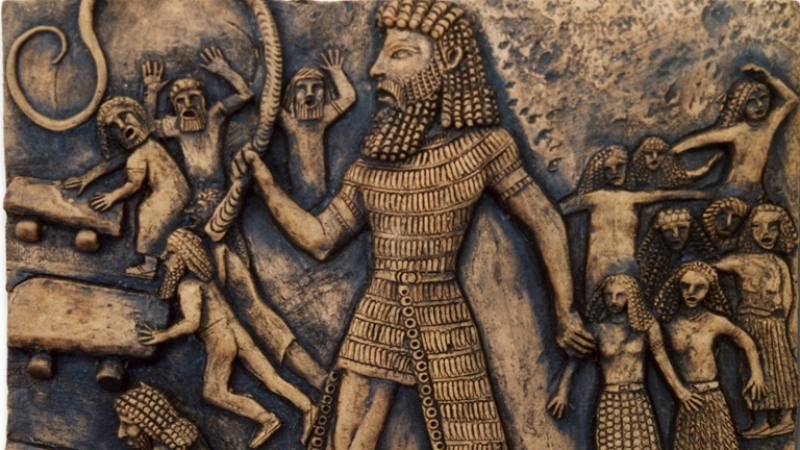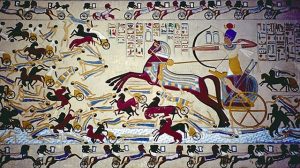Imagine grasping eternal life in your hands just to watch it disappear before your eyes. Or imagine that the hardest journey of your life is finally over and you have failed to obtain the very thing you wanted most. Our story begins in a land known as Mesopotamia about four thousand years ago. There one of the earliest cities in history existed, called Uruk, which lies on the Euphrates river near the Persian Gulf. This city became famous for being the site of one of the earliest piece of literature ever created, The Epic of Gilgamesh. Although in this story Gilgamesh, the hero, is the king of Uruk, he is also partly a god. He is one part mortal and two parts divine, and as such, he was a being full of beauty and courage, but also as terrifying as a wild bull.1 The Epic of Gilgamesh is an adventure story with many exciting parts. However, one of the central themes of the epic revolves around Gilgamesh’s search for immortality.2

Gilgamesh’s quest for everlasting life begins when his friend Enkidu unexpectedly dies. The trauma from losing his dear friend scares Gilgamesh. Enkidu isn’t just a dear friend to Gilgamesh, Enkidu is like a brother to him. The gods had originally created Enkidu to help stop Gilgamesh from stirring up trouble, but after they met, they got along so well that they became brothers and went on countless journeys together. With Enkidu’s death, Gilgamesh is so terrified by the idea of death that he goes on a long journey to beat the inevitable. On this journey he meets several people who tell him that his journey is pointless and that he won’t find what he is searching for. But Gilgamesh doesn’t listen, and pushes forward regardless of what people say. He is so determined to find Utnapishtim, the only human who had been made immortal, but doing so he ignores what his body really desires, sleep. He completely exhausted himself to the point where he was near dying.
After a long and dangerous journey, Gilgamesh finally meets Utnapishtim, who tells Gilgamesh, “There is no permanence. Do we build a house to stand forever, do we seal a contract to hold for all time?…. When the Anunnaki, the judges, come together, and Mammetun the mother of destinies, together they decree the fates of men. Life and death they allot but the day of death they do not disclose.”3 Even with the wise information that Utnapishtim tells him, Gilgamesh is still in pursuit of immortality, so Utnapishtim decides to put him up to a test. The test requires him to stay awake for six days and seven nights, but Gilgamesh ultimately fails the test. Utnapishtim had a kind heart and told him that, instead of obtaining immortality, he might obtain youthfulness. There was a plant in the sea that can restore one’s youth. So of course Gilgamesh doesn’t hesitate in jumping in to find this plant. He finally gets the key to youthfulness, and decides to rest and relax, because he believes his troubles are over. With his guard down, a snake snatches the plant away from him and the plant is gone forever.
Gilgamesh finally accepts this fate, and goes back to the land of Uruk. Although he never got immortality, he did get what he needed. Throughout the story the same line recurs about what is he suppose to do after Enkidu’s death, which is just to live his normal, mortal life.4 Once he returns, he writes on a wall the story of his long journey for immortality. The world may never know if there was a real living, breathing ruler named Gilgamesh, but at least for now we have a legendary one that will last forever.
- Jerry Bentley, Herbert Ziegler, and Heather Streets Salter, Traditions & Encounters: A Brief Global History Volume 1. 4th edition (New York: McGraw Hill, 2015), 5. ↵
- Tzvi Abusch, “The Development and Meaning of the Epic of Gilgamesh: An Interpretive Essay,” Journal of the American Oriental Society 121, no. 4 (2001): 614. ↵
- Nancy K. Sanders, The epic of Gilgamesh (Harmondsworth, Middlesex: Penguin Books, 1964), 23. ↵
- Nicola Vulpe, “Irony and the Unity of the Gilgamesh Epic,” Journal of Near Eastern Studies 53, no. 4 (1994): 280. ↵



93 comments
Nathan Alba
I really liked how the article was written. And to think this epic was written so long ago shows that people have been pondering death for what seems like all of mankind. I think the story has to do with a lot of realization, in that being that no one can escape the inevitable. No matter how hard we try, no matter how far we search. Sometimes it’s harder for some people to come to terms with, sometimes it’s just hard to understand, nut unfortunately immortality will never be possible.
Mariah Cavanaugh
I really enjoyed your article! I think ancient literature is a fascinating glimpse into the way our ancestors thought about their existence. We struggle so much with death and things were not so different long ago. To me the story of Gilgamesh, whether based on a real being or simple fiction, is one of the pain of losing someone dear to you and working to come to grips with your own mortality. I think you captured this very well in your article!
Kathyleen Lauriano
I’ve always been fascinated by the idea of immortality. To think that you could live forever is amazing. You would never have to worry about dying of old age at all. Honestly I never knew about Gilgamesh until now. I find the whole moral of the story being to “live your life” very true. Its sad that his friend had to die in order for him to realize how much his life was worth.
Clarissa Gonzalez
I feel like I’m so behind on my knowledge of Gods and Goddesses. I was never really into it when I was younger, but seeing the stories that are paired with them, I really missed out. This long journey that Gilgamesh is in, kept me interested in what he had to teach, and what went wrong. The fact that there isn’t a real “happy ending” is always nice, when it isn’t what is common.
Jonathan Arreola
I find it incredible how we find stories such as the one of Gilgamesh from thousands of years ago, and cant discover whether it actually happened in the past of if it is simply a tale passed on from generation to generation. The search for immortality is kind of ironic, as Gilgamesh nears death as a result of his journey. I think its really unfortunate that he lost the plant that would restore his youth, he had his desire in his hands and it got snatched in seconds. I enjoyed the ending of his journey, that he learns to accept his fate and lives immortal through his story.
Esperanza Rojas
I first clicked to read the article because we had just discussed this same topic in class. I really loved the way it starts in the beginning, where it sounds like a fairy tale or the beginning of a really old tale. It captures the reader’s attention right away. The story itself was also told very graphically but not too much detail which was great, but the only thing I wish was in there was how Utnapishtim’s story of immortality was an inspiration to the story of Noah, but otherwise, it was a fun read.
Engelbert Madrid
I was introduced to the story of Gilgamesh when I took a three-week trip to Franklin & Marshall College for college preparation. I did not have a clue that the Epic of Gilgamesh is history’s oldest piece of literature of ancient civilization. In this piece of literature, immortality is the biggest theme, in which Gilgamesh seeks, so that he could be immortal. He does not want to die, for he is skeptical of what happens after death. I believe this piece of writing gives historians a better understanding of what people thought and wanted to learn more about life and death.
John Berka
In my opinion this story is an important one, because Gilgamesh is out running himself ragged looking to improve himself and prolong his life that he is not enjoying his life. Accepting the fact that we are all going to meet our end one day is an important step in finding happiness and maturing and accepting who you are. Once Gilgamesh realized he would never be able to achieve immortality he was able to accept his lot in life and go back to actually living his life.
Madison Downing
This story truly reminds me of Beowulf, which was one of the first epic poems ever written, and how he too was chasing something but ended up learning that were other things in life. I never knew about the Epic of Gilgamesh but after reading your article I am going to definitely look into it more. It must have been extremely terrible for Gilgamesh that Enkidu, who was seen as his own brother, died and left him feeling alone in this world. But I wonder why Gilgamesh would want to become immortal. I know that he became scared of the fact of death but wouldn’t it have been reassuring that when his time finally came he would’ve been able to see his brother again? I am happy by the end of the story that Gilgamesh finally learned the best thing he can do is just live his life and preserve the memory of his dear brother. Such a touching tale!
Jabnel Ibarra
The idea of mortality is one that has always been universally feared by humanity. Since before written records began, mankind has considered the possibility of life after death, a way that would allow us to exist forever, to “live” past our lifetimes. This mindset has presented itself in many forms throughout history, such as the Christian belief in heaven or the Viking belief in Valhalla. Each of these varieties carries the same theme of a refusal to the notion that life ends in death. The Epic of Gilgamesh is interesting not only because it is one of the earliest pieces of literature to be discovered, but because it deals with heavy themes such as the futility of fighting mortality and accepting that almost nothing is permanent.